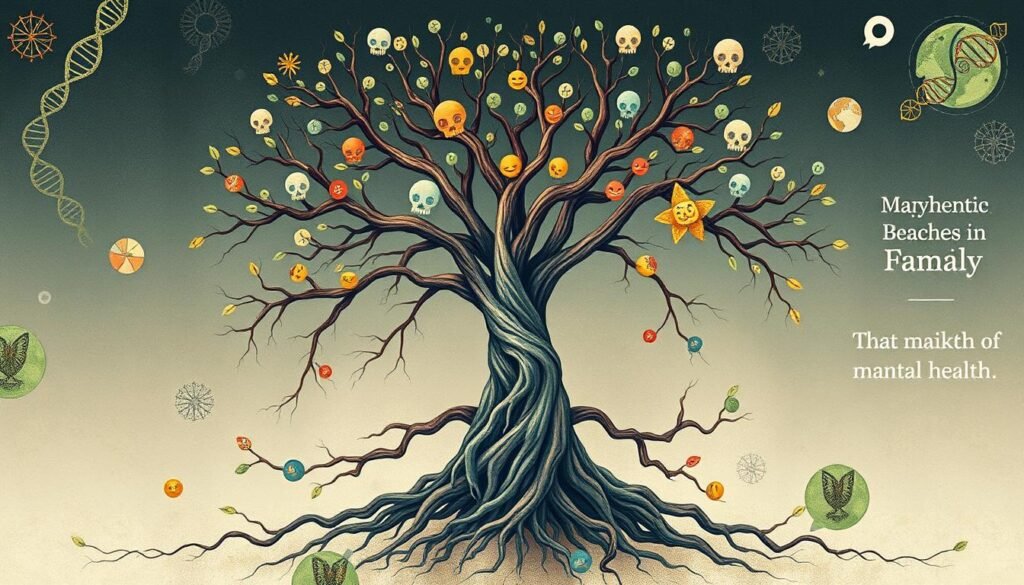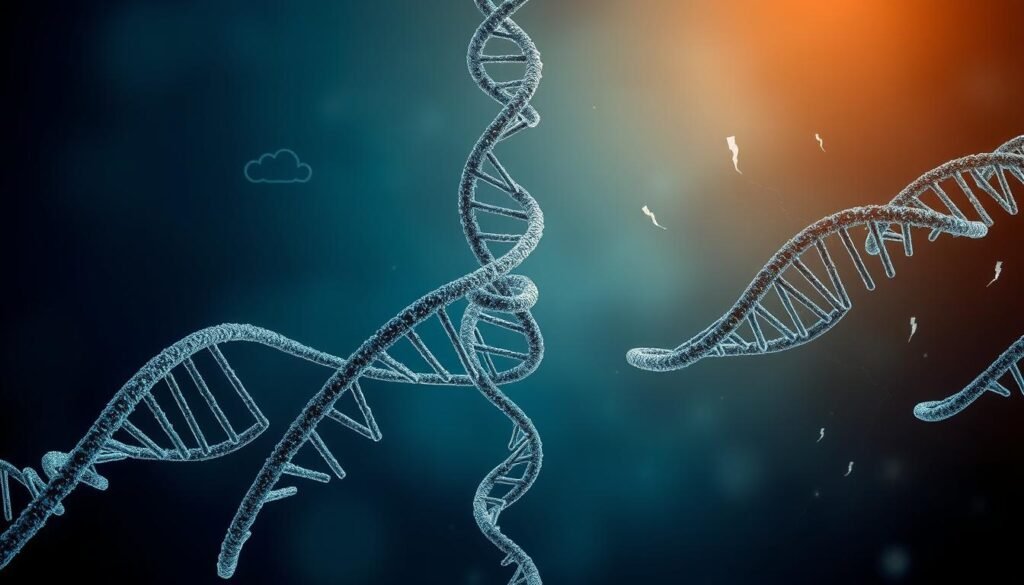It’s surprising but true: At least 10% of people in the U.S. will battle major depressive disorder sometime in their life. This fact stresses the need to understand depression’s potential genetic roots. Realizing how family history affects one’s chances of facing this mood disorder is key. Research shows having a parent or sibling with major depression increases your risk 2-3 times. This clearly shows how genetics and mental health are connected.
This article dives into how genes related to mood disorders and environment interact. It sheds light on why understanding both genetics and family history is crucial in tackling depression. As science progresses, we’re learning more about how these factors combine to affect our mental health.
Key Takeaways
- Major depressive disorder affects at least 10% of individuals in the U.S. at some point in their lives.
- Heritability estimates for major depression range from 40% to 50%.
- Having a parent or sibling with depression significantly increases one’s risk.
- Recurrent depression can affect siblings and children at rates 4-5 times greater than average.
- Environmental factors, including childhood experiences, also play a significant role in depression risk.
What is Depression and Its Impact?
Depression is a major issue for both individuals and society. It’s a top mental health problem. Millions suffer from major depressive disorder. They face emotional, psychological, and physical problems.
This disorder greatly affects everyday life and happiness.
Defining Major Depressive Disorder
Major depressive disorder (MDD) means feeling sad and hopeless a lot. It also means losing interest in things you once liked. There are other symptoms too, like changes in sleep and eating, feeling tired, and trouble focusing.
MDD is a big problem worldwide. It causes emotional pain. It’s also a leading cause of disability across the globe.
Prevalence of Depression in the U.S.
A lot of Americans struggle with depression. Over 19 million adults, or 6.7%, have major depressive disorder every year. This shows how important it is to help people with mental health issues.
Worldwide, around 350 million people are affected. Depression is a global problem, not just in the U.S.
Demographics: Gender Disparities in Depression
More women than men experience depression. About 15% of women will face it in their lifetime, while 8% of men will. This might be due to hormone changes and different pressures in life.
Understanding these differences helps create better support for everyone. It’s key to a broader approach to mental health care.
Understanding the Genetics of Depression
Research on depression now focuses on how our genes play a part. The connection between our genes and depression is complex. Studies show genetics cause about 40% to 50% of depression risks.
Looking into twins has helped us better understand this genetic link. It gives us clearer insights into why some people are more likely to be depressed.
The Role of Heritability in Depression
If depression runs in your family, you’re more likely to face it too. Having a close relative with depression doubles or triples your own risk. This shows how similar depression can be within families, underlining the role of genes.
Identical vs. Fraternal Twin Studies
Studying twins has been key in learning about depression’s genetic sides. Identical twins both show depression more often than fraternal twins do. This underscores how crucial genetics are in understanding depression.
A detailed report on twin studies shows how depression tends to run in families. It highlights the power of our genes in shaping our mental health.
Depressive Disorder Inheritance
Having a family member with depressive disorder can increase your own risk. It’s key to understand how depression can be passed down. This knowledge helps identify who might be more at risk. Knowing this urges the need for early intervention and prevention.
Family History as a Risk Factor
Your chance of getting depressed is more with family who have it. If a close family member suffers from MDD, your risk can double or triple. This link between family history and personal mental health is important. When depression is common in your family, your risk jumps even higher. Realizing the role of family in depression is essential for getting help early.
Calculating Increased Risk in Relatives
Risk calculations involve genetics and the environment. Studies show that genetics account for about 37% of depression risks. Yet, environments play a huge role too. Many genes tied to depression make the picture complex. For a deeper understanding, ongoing research is crucial. It helps us grasp how family history impacts depression risks.
Depression Genetic: Family History and Risk Factors
Learning about family risk factors in depression supports why some get this condition more easily. Studies show a clear link between family history and depression odds. Knowing this can help spot those at greater risk.
Impact of Having a Parent or Sibling with Depression
If a parent or brother or sister has depression, your own risk goes up. Those with family history face a 20-30% chance of depression. That’s way higher than the 10% in the general crowd. This link between family suggests both genes and environment matter. Keeping an eye on family mental health history is key.
Understanding Recurrent Depression in Families
Depression that comes back is common in families, raising the risk for close relatives. If your family has a history of recurrent depression, your risk is much higher. It shows how genes and environment work together in mental health. For more detailed info on these risks, you can check out resources here.

| Family Relationship | Risk of Developing Depression |
|---|---|
| General Population | 10% |
| With a Parent or Sibling with Depression | 20-30% |
| Siblings/Children of Individuals with Recurrent Depression | 4-5 times higher risk |
The Role of Environmental Factors in Depression
Understanding depression means knowing how important environmental factors are. These factors play a big role, well beyond our genes. They make it more likely for someone to develop depression.
People touched by various outside influences have a greater chance of facing depression. It’s a tough condition to deal with.
Non-Genetic Influences on Depression Risk
Depression’s environmental factors come from many areas. They range from childhood events to societal pressures. Important factors include:
- Childhood trauma: Bad experiences, like emotional neglect or abuse, can mess up how we handle emotions. This raises the risk of depression later.
- Life stressors: Big life changes or traumas can bring on or worsen depression for some.
- Pollution: Air pollution can affect brain health, possibly making mental health issues more likely.
- Noise pollution: Constant loud noises, like from cars or construction, can hurt sleep and make us feel more anxious or depressed.
Childhood Trauma and its Link to Future Depression
Childhood trauma is a big warning sign for mental health problems, including depression. Kids who go through trauma might face serious mental health challenges later. This affects their whole life.
Some effects include a stronger reaction to stress and turning to unhealthy habits. They may also struggle in making and keeping healthy relationships. This comes from tough times in childhood. Mental health issues can also make it harder to find and keep a job, leading to money problems.
A Potential “Depression Gene”?
Exploring mood disorders means looking into mood disorder genes. These are linked with a higher chance of getting depression. No “depression gene” has been found yet. But, many genetic changes can make a person more likely to have depression. Some studies suggest that genes related to depression might work differently in men and women.
Genetic Variations and Their Influence on Depression
Recent studies in depression genomics found over 100 genetic areas related to depression. If a close family member has depression, you might be three times more likely to have it too. It seems that women might be more affected by genetic factors than men. Genes like PDE4A, FDX1L, and MYO15B are linked to depression. Some changes in these genes might also affect how well treatments work.
Understanding Polygenic Risk Factors
Polygenic risk factors are when many genes add up and slightly increase the chance of having depression. Genetics is important, but your environment and life events matter too. How these factors mix can affect if someone will face depression, its seriousness, and how long it lasts.

Relationships Between Major Depression and Other Disorders
Understanding how major depression and other mood disorders interact is key. Knowing this helps doctors diagnose and treat effectively. Major depression and bipolar disorder overlap is complex.
This mix makes treatment harder and symptoms more intense for people.
Bipolar Disorder and Co-occurrence with Depression
Bipolar disorder switches between high and low mood phases. During low phases, symptoms of major depression show up. Those with family bipolar history are more likely to have depression too.
This link underlines the need to consider genetic risks in treatment plans.
Association with Anxiety Disorders
Major depression often comes with anxiety disorders, like generalized anxiety or panic disorder. These conditions share common causes, usually genetics. When major depression and anxiety disorders happen together, symptoms worsen.
| Disorder | Co-occurrence Rate | Common Symptoms |
|---|---|---|
| Bipolar Disorder | Approximately 30% of individuals | Mania, depression, mood swings |
| Generalized Anxiety Disorder | Over 50% of individuals with major depression | Excessive worry, restlessness, sleep disturbances |
| Panic Disorder | 25-40% of those with major depression | Panic attacks, fear of future attacks, avoidance behaviors |
Clinical and Psychosocial Vulnerabilities
To understand depression, we need to look closely at its clinical and psychosocial causes. Neuroticism stands out as a key trait that can lead to depression. People high in neuroticism often feel negative emotions more deeply, making them more prone to depression.
Neuroticism and Personality Traits Related to Depression
Neuroticism affects emotional stability. Those high in this trait react more intensely to stress, worsening mental health issues. Neuroticism and depression are closely linked, showing how our traits influence mental health risks. Studies show neuroticism’s impact mixes with other psychosocial factors, increasing the risk of depression.
Impact of Socioeconomic Factors
Socioeconomic factors play a big role in depression. Education levels, income, and resource access can all affect mental health risks. People from lower socioeconomic backgrounds often face more stress, leading to depression. Childhood abuse, more common in these groups, also raises depression risks. These challenges show how society and psychology are connected in mental health.
Psychiatric Genomics and Depression
Psychiatric genomics is changing how we see depression and genes. It shows how our genes might make us more likely to feel sad. Scientists studying depression genetics have found it’s not simple. To really understand, they need many samples and smart ways to analyze them.
Insights from Current Research
Studies say that genes play a 37% role in depression. This is a big deal. Through studying genes, scientists have found over 100 spots in our DNA linked to depression. This gives clues about what’s happening in our bodies.
Finding these genetic spots was hard at first. But as we learn more, we keep finding how certain genes are connected to feeling depressed. Yet, these spots explain less than 5% of why people get depressed. This means we have a lot more to learn.
Most people in these studies are from Europe. This limits who the findings apply to. Studies with other groups haven’t found the same results yet. This shows we need more varied research.
The Future of Depression Genetic Studies
Future studies need to look at how men and women are different in terms of genetic risks for depression. Women are more affected than men. How our genes and life experiences mix might help us prevent or better treat depression. Also, matching treatments to our genes could change how we fight depression.
Measuring Familial Risk for Depression
It’s vital to grasp how we measure familial risk when tackling depression. The Continuous Familial Loading Score (FLS) plays a key role. It looks at family history and the specifics of the disorder. Research shows this method sheds light on depression’s severity and when symptoms might start.
Continuous Familial Loading Score (FLS) Explained
The Continuous Familial Loading Score combines different family risk factors for depression. In a study with 57,308 people across various groups, a strong link was found. For younger people with a family history of depression, memory struggles were notable. The biggest differences were seen in the TGS cohort, showing a mean difference of -0.55.
In older participants, like those from the UK Biobank, FLS highlighted ties to cognitive areas. These include processing speed, attention, and executive function. Highlighting that high familial risk brings unique cognitive issues. This helps us understand how depression affects people differently.
Implications for Clinical Assessments
Using the Continuous Familial Loading Score has big implications in treating depression. Research suggests that high scores point to more severe symptoms and earlier depression start. This knowledge helps mental health experts create custom treatment plans. Plans are based on a person’s genetic makeup and family history.
Also, scores from genetic studies give a clearer view of depression’s polygenic nature. This aligns with how heritable major depressive disorder is. Recognizing both genetic and environmental factors is crucial in clinical settings.

| Cohort | Participants | Mean Difference (FLS) | Cognitive Domain Affected |
|---|---|---|---|
| TGS | 87 | -0.55 | Memory |
| ABCD | 10,258 | -0.09 | Memory |
| Add Health | 1,064 | -0.16 | Memory |
| UK Biobank | 45,899 | -0.10 | Processing Speed, Attention, Executive Function |
Conclusion
The discussion about depression risk shows the balance between genes and environment. Studies at Washington University stress the importance of family history in depression. These findings highlight that genes and their interaction with environmental factors are key to understanding depression.
Recent research with over 40,000 people has changed our view on depression genes. Findings challenge old thoughts about serotonin and depression. This ongoing research is crucial in finding out which genes affect depression risk. It also opens doors for new treatments.
Understanding depression requires looking at both genes and personal experiences. It is vital for both individuals and doctors to consider these factors. This approach helps in creating support for those dealing with depression. As studies evolve, they could change how we see and treat depression.